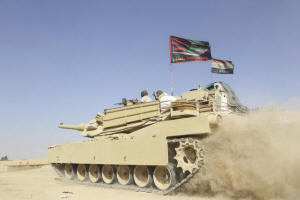|
Iraqi forces attempt first push into
Mosul as offensive enters third week
 Send a link to a friend
Send a link to a friend
 [October 31, 2016]
By Stephen Kalin and Maher Chmaytelli [October 31, 2016]
By Stephen Kalin and Maher Chmaytelli
EAST OF MOSUL/BAGHDAD, Iraq (Reuters) - An
elite Iraqi army unit advanced towards the built-up area of the Islamic
State stronghold of Mosul on Monday after two weeks of fighting to clear
surrounding areas of the insurgents.
Military commanders said that the U.S.-backed offensive to recapture
Mosul -- the largest military operation in Iraq since the U.S.-led
invasion that toppled Saddam Hussein in 2003 -- could still take weeks
and possibly months.
"The battle of Mosul will not be a picnic," Hadi al-Amiri, leader of the
Badr Organisation, the largest Shi'ite militia fighting with Iraqi
government forces, said from the southern frontline.
"We are prepared for the battle of Mosul even if it lasts for months".
Troops from the Counter Terrorism Service (CTS) were moving in on
Gogjali, an industrial zone on Mosul's eastern outskirts, and could
enter it later on Monday, an officer from the U.S.-trained unit told a
Reuters correspondent just east of Mosul.
The zone lies about a kilometer from the administrative border of Mosul.

"The operation to liberate the left bank of Mosul has started," a
military statement said, referring to the eastern bank of the river that
flows from north to south.
The capture of Mosul would mark the militants' effective defeat in the
Iraqi half of the caliphate that Islamic State leader Abu Bakr
al-Baghdadi declared two years ago from the city's Grand Mosque.
It is still home to 1.5 million residents, making it four of five times
bigger than any other city they seized in both Iraq and Syria.
Other military statements said five villages were taken north of Mosul,
where Kurdish Peshmerga fighters are also being deployed, while army
units advanced in the south.
Pro-Iranian Iraqi Shi'ite militias joined the fighting on Saturday,
aiming to cut the route between Mosul and Raqqa, Islamic State's main
stronghold in Syria.
Islamic State militants has been fighting off the offensive with suicide
car bombs, snipers and mortar fire.
They have also set oil wells on fire to cover their movements and
displaced thousands of civilians from villages toward Mosul, using them
as "human shields", U.N. officials and villagers have said.
[to top of second column] |

A tank of the Iraqi army drives south of Mosul, Iraq October 30,
2016. REUTERS/Stringer

"Scorched earth tactics employed by retreating ISIL members are
having an immediate health impact on civilians, and risk long-term
environmental and health consequences," the U.N.'s Office for the
Coordination of Humanitarian Affairs said.
SHI'ITE FLAGS
U.N. forecasts see up to 1 million people being uprooted by the
fighting, which U.N. aid agencies said had so far forced about
17,500 people to flee -- a figure that excludes those taken into
Mosul by the retreating militants.
Islamic State said it killed 35 Shi'ite militia fighters and
pro-government Sunni fighters in a suicide attack near Hadditha, in
the western Anbar province, a hotbed of the Sunni insurgency against
U.S. forces and the Shi'ite-led government that took over after the
overthrow of Saddam. Iraqi officials didn't confirm the attack.
The flying of Shi'ite flags by the militias and also some regular
army and police units in the mostly Sunni region around Mosul has
been a cause of concern for local officials.
But the Hashid Shaabi, or Popular Mobilization forces, as the
militias are collectively known, have not been linked to any
sectarian incidents so far.
The deployment of Shi'ite forces in northern Iraq brought warnings
from Turkish President Tayyip Erdogan on Saturday.
The town of Tal Afar, which the Shi'ite forces say they will
recapture, is Turkmen - inhabited by people with strong cultural and
historical links to Turkey, Erdogan said.

He said he would act if the Popular Mobilisation forces "unleash
terror" in this town located about 55 km (35 miles) west of Mosul.
(Editing by Angus MacSwan)
[© 2016 Thomson Reuters. All rights
reserved.]
Copyright 2016 Reuters. All rights reserved. This material may not be published,
broadcast, rewritten or redistributed. |